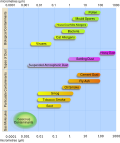Particulates
Particulates or Particulate Matter (PM) are tiny pieces of solid or liquid matter associated with the Earth's atmosphere. They are suspended in the atmosphere as atmospheric aerosol, a term which refers to the particulate/air mixture, as opposed to the particulates alone. Sources of particulate matter can be natural or anthropogenic. They have impacts on climate and precipitation that adversely affect human health, in ways additional to direct inhalation.
Sources and Composition[edit]
Particulates can be derived from various sources both natural and anthropogenic. Natural sources include volcanoes, dust storms, forest and grassland fires, living vegetation, and sea spray. Human activities, such as the burning of fossil fuels and the alteration of natural surface cover, also generate significant amounts of particulates. Fuel burning in stationary sources, including residential wood burning, power plants, and industrial processes, as well as mobile sources such as automobiles, are among the major anthropogenic sources of particulates.
Health and Environmental Impact[edit]
Exposure to particulate matter can cause a number of health problems. For instance, it can lead to respiratory and cardiovascular issues, premature death, allergic reactions and other health problems. Particulates in the atmosphere also have an effect on the Earth's climate. Depending on their albedo (reflectivity), they can either cool the surface of the planet by reflecting sunlight back into space, or warm it by absorbing and re-radiating sunlight as heat.
Measurement and Regulation[edit]
The size of the particles is a main determinant of where in the respiratory tract the particles will come to rest when inhaled. Because of this, regulatory agencies such as the Environmental Protection Agency (EPA) in the United States have established standards and guidelines for PM measurements and emissions.
See Also[edit]

This article is a environment-related stub. You can help WikiMD by expanding it!
This climate change related article is a stub. You can help WikiMD by expanding it.
-
PM and a human hair
-
Airborne particulate size chart
-
Dust emission when using electrical power tools
-
Warsaw Excavator
-
Atmospheric Aerosol Eddies and Flows
-
MODAL2 M AER RA
-
Display VSON WP6910 (air detector) - pm2.5 at Verona (Borgo Milano) Italy
-
Construction dust emitted and rising up during the building rehabilitation of Treasure Garden, Tai Po, Hong Kong
-
Radiative forcing (warming influence) - global warming
-
Modis aerosol optical depth
-
MODAL2 M AER OD
-
Cloud
Ad. Transform your life with W8MD's Budget GLP-1 injections from $75


W8MD offers a medical weight loss program to lose weight in Philadelphia. Our physician-supervised medical weight loss provides:
- Weight loss injections in NYC (generic and brand names):
- Zepbound / Mounjaro, Wegovy / Ozempic, Saxenda
- Most insurances accepted or discounted self-pay rates. We will obtain insurance prior authorizations if needed.
- Generic GLP1 weight loss injections from $75 for the starting dose.
- Also offer prescription weight loss medications including Phentermine, Qsymia, Diethylpropion, Contrave etc.
NYC weight loss doctor appointmentsNYC weight loss doctor appointments
Start your NYC weight loss journey today at our NYC medical weight loss and Philadelphia medical weight loss clinics.
- Call 718-946-5500 to lose weight in NYC or for medical weight loss in Philadelphia 215-676-2334.
- Tags:NYC medical weight loss, Philadelphia lose weight Zepbound NYC, Budget GLP1 weight loss injections, Wegovy Philadelphia, Wegovy NYC, Philadelphia medical weight loss, Brookly weight loss and Wegovy NYC
|
WikiMD's Wellness Encyclopedia |
| Let Food Be Thy Medicine Medicine Thy Food - Hippocrates |
Medical Disclaimer: WikiMD is not a substitute for professional medical advice. The information on WikiMD is provided as an information resource only, may be incorrect, outdated or misleading, and is not to be used or relied on for any diagnostic or treatment purposes. Please consult your health care provider before making any healthcare decisions or for guidance about a specific medical condition. WikiMD expressly disclaims responsibility, and shall have no liability, for any damages, loss, injury, or liability whatsoever suffered as a result of your reliance on the information contained in this site. By visiting this site you agree to the foregoing terms and conditions, which may from time to time be changed or supplemented by WikiMD. If you do not agree to the foregoing terms and conditions, you should not enter or use this site. See full disclaimer.
Credits:Most images are courtesy of Wikimedia commons, and templates, categories Wikipedia, licensed under CC BY SA or similar.
Translate this page: - East Asian
中文,
日本,
한국어,
South Asian
हिन्दी,
தமிழ்,
తెలుగు,
Urdu,
ಕನ್ನಡ,
Southeast Asian
Indonesian,
Vietnamese,
Thai,
မြန်မာဘာသာ,
বাংলা
European
español,
Deutsch,
français,
Greek,
português do Brasil,
polski,
română,
русский,
Nederlands,
norsk,
svenska,
suomi,
Italian
Middle Eastern & African
عربى,
Turkish,
Persian,
Hebrew,
Afrikaans,
isiZulu,
Kiswahili,
Other
Bulgarian,
Hungarian,
Czech,
Swedish,
മലയാളം,
मराठी,
ਪੰਜਾਬੀ,
ગુજરાતી,
Portuguese,
Ukrainian






